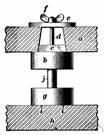concretion
(redirected from Concretions)Also found in: Thesaurus, Medical, Encyclopedia.
con·cre·tion
(kən-krē′shən)n.
1.
a. The act or process of concreting into a mass; coalescence.
b. The state of having been concreted: a concretion of seminal ideas in her treatise.
2. A solid hard mass.
3. Geology A rounded mass of mineral matter found in sedimentary rock.
4. Medicine A solid mass, usually composed of inorganic material, formed in a cavity or tissue of the body; a calculus.
con·cre′tion·ar′y (-shə-nĕr′ē) adj.
American Heritage® Dictionary of the English Language, Fifth Edition. Copyright © 2016 by Houghton Mifflin Harcourt Publishing Company. Published by Houghton Mifflin Harcourt Publishing Company. All rights reserved.
concretion
(kənˈkriːʃən)n
1. the act or process of coming or growing together; coalescence
2. a solid or solidified mass
3. something made real, tangible, or specific
4. (Geological Science) any of various rounded or irregular mineral masses formed by chemical precipitation around a nucleus, such as a bone or shell, that is different in composition from the sedimentary rock that surrounds it
5. (Pathology) pathol another word for calculus
conˈcretionary adj
Collins English Dictionary – Complete and Unabridged, 12th Edition 2014 © HarperCollins Publishers 1991, 1994, 1998, 2000, 2003, 2006, 2007, 2009, 2011, 2014
con•cre•tion
(kɒnˈkri ʃən, kɒŋ-)n.
1. the act or process of concreting or becoming substantial; coalescence; solidification.
2. the state of being concreted.
3. a solid mass formed by or as if by coalescence or cohesion: a concretion of melted candies.
4. anything that is made real, tangible, or particular.
5. a solid or calcified mass in the body formed by a disease process.
6. a rounded mass of mineral matter occurring in sandstone, clay, etc., often in concentric layers about a nucleus.
[1535–45; < Latin]
con•cre′tion•ar′y, adj.
Random House Kernerman Webster's College Dictionary, © 2010 K Dictionaries Ltd. Copyright 2005, 1997, 1991 by Random House, Inc. All rights reserved.
Concretion
a lump, nodule, or clot; a cohesion of particles.Examples: concretion of ceremonial matters, 1634; of marine shells, 1796; of salt, 1697; of slime, 1626.
Dictionary of Collective Nouns and Group Terms. Copyright 2008 The Gale Group, Inc. All rights reserved.
ThesaurusAntonymsRelated WordsSynonymsLegend:
Switch to new thesaurus
| Noun | 1. | concretion - the formation of stonelike objects within a body organ (e.g., the kidneys) natural action, natural process, action, activity - a process existing in or produced by nature (rather than by the intent of human beings); "the action of natural forces"; "volcanic activity" |
| 2. | concretion - a hard lump produced by the concretion of mineral salts; found in hollow organs or ducts of the body; "renal calculi can be very painful" bladder stone, cystolith - a calculus formed in the bladder enterolith - a calculus occurring in the intestines ptyalith - calculus in a salivary gland salivary calculus, sialolith - a stone formed in the salivary gland urolith - a urinary stone | |
| 3. |  concretion - an increase in the density of something concretion - an increase in the density of somethingconcentration - increase in density | |
| 4. | concretion - the union of diverse things into one body or form or group; the growing together of parts jointure, uniting, unification, conjugation, union - the act of making or becoming a single unit; "the union of opposing factions"; "he looked forward to the unification of his family for the holidays" |
Based on WordNet 3.0, Farlex clipart collection. © 2003-2012 Princeton University, Farlex Inc.
Translations
Collins Spanish Dictionary - Complete and Unabridged 8th Edition 2005 © William Collins Sons & Co. Ltd. 1971, 1988 © HarperCollins Publishers 1992, 1993, 1996, 1997, 2000, 2003, 2005
concretion
Collins German Dictionary – Complete and Unabridged 7th Edition 2005. © William Collins Sons & Co. Ltd. 1980 © HarperCollins Publishers 1991, 1997, 1999, 2004, 2005, 2007
con·cre·tion
n. concreción, bezoar o masa inorgánica que se acumula en partes del cuerpo.
English-Spanish Medical Dictionary © Farlex 2012